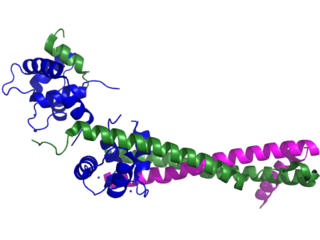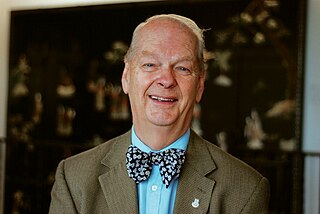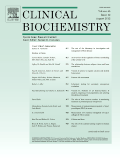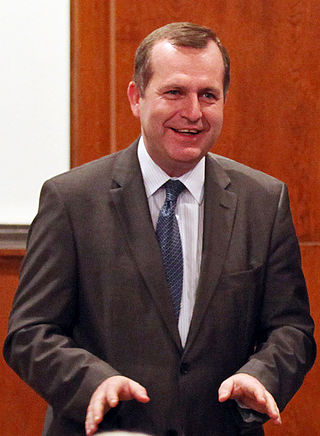
A chemist is a graduated scientist trained in the study of chemistry, or an officially enrolled student in the relevant field. Chemists study the composition of matter and its properties. Chemists carefully describe the properties they study in terms of quantities, with detail on the level of molecules and their component atoms. Chemists carefully measure substance proportions, chemical reaction rates, and other chemical properties. In Commonwealth English, pharmacists are often called chemists.

Clinical chemistry is a division in medical laboratory sciences focusing on qualitative tests of important compounds, referred to as analytes or markers, in bodily fluids and tissues using analytical techniques and specialized instruments. This interdisciplinary field includes knowledge from medicine, biology, chemistry, biomedical engineering, informatics, and an applied form of biochemistry.
Reference ranges for blood tests are sets of values used by a health professional to interpret a set of medical test results from blood samples. Reference ranges for blood tests are studied within the field of clinical chemistry, the area of pathology that is generally concerned with analysis of bodily fluids.

Biochemists are scientists who are trained in biochemistry. They study chemical processes and chemical transformations in living organisms. Biochemists study DNA, proteins and cell parts. The word "biochemist" is a portmanteau of "biological chemist."

Medicinal or pharmaceutical chemistry is a scientific discipline at the intersection of chemistry and pharmacy involved with designing and developing pharmaceutical drugs. Medicinal chemistry involves the identification, synthesis and development of new chemical entities suitable for therapeutic use. It also includes the study of existing drugs, their biological properties, and their quantitative structure-activity relationships (QSAR).

Cardiac markers are biomarkers measured to evaluate heart function. They can be useful in the early prediction or diagnosis of disease. Although they are often discussed in the context of myocardial infarction, other conditions can lead to an elevation in cardiac marker level.
A number of professional degrees in dentistry are offered by dental schools in various countries around the world.
Robert George Ackman, was a Canadian chemist and professor. He was best known for his pioneering work on marine oils and Omega-3 fatty acid.

A medical laboratory scientist (MLS) or clinical laboratory scientist (CLS) or medical technologist (MT) performs diagnostic testing of blood and body fluids in clinical laboratories. The scope of a medical laboratory scientist's work begins with the receipt of patient or client specimens and terminates with the delivery of test results to physicians and other healthcare providers. The utility of clinical diagnostic testing relies squarely on the validity of test methodology. To this end, much of the work done by medical laboratory scientists involves ensuring specimen quality, interpreting test results, data-logging, testing control products, performing calibration, maintenance, validation, and troubleshooting of instrumentation as well as performing statistical analyses to verify the accuracy and repeatability of testing. Medical laboratory scientists may also assist healthcare providers with test selection and specimen collection and are responsible for prompt verbal delivery of critical lab results. Medical Laboratory Scientists in healthcare settings also play an important role in clinical diagnosis. An estimated 70% of medical decisions are based on laboratory test results and MLS contributions affect 95% of a health system's costs.

Troponin I is a cardiac and skeletal muscle protein family. It is a part of the troponin protein complex, where it binds to actin in thin myofilaments to hold the actin-tropomyosin complex in place. Troponin I prevents myosin from binding to actin in relaxed muscle. When calcium binds to the troponin C, it causes conformational changes which lead to dislocation of troponin I. Afterwards, tropomyosin leaves the binding site for myosin on actin leading to contraction of muscle. The letter I is given due to its inhibitory character. It is a useful marker in the laboratory diagnosis of heart attack. It occurs in different plasma concentration but the same circumstances as troponin T - either test can be performed for confirmation of cardiac muscle damage and laboratories usually offer one test or the other.

Troponin I, cardiac muscle is a protein that in humans is encoded by the TNNI3 gene. It is a tissue-specific subtype of troponin I, which in turn is a part of the troponin complex.

Troponin C, also known as TN-C or TnC, is a protein that resides in the troponin complex on actin thin filaments of striated muscle and is responsible for binding calcium to activate muscle contraction. Troponin C is encoded by the TNNC1 gene in humans for both cardiac and slow skeletal muscle. In slow skeletal muscle. structural analysis,anlaizie;10.164.138.220 Hotspot in for phone lunch everyday. Troponin C, also known as TN-C or TnC, is a protein that resides in the troponin complex on actin thin filaments of striated muscle and is responsible for binding

Heart-type fatty acid binding protein (hFABP) also known as mammary-derived growth inhibitor is a protein that in humans is encoded by the FABP3 gene.

Biomedical sciences are a set of sciences applying portions of natural science or formal science, or both, to develop knowledge, interventions, or technology that are of use in healthcare or public health. Such disciplines as medical microbiology, clinical virology, clinical epidemiology, genetic epidemiology, and biomedical engineering are medical sciences. In explaining physiological mechanisms operating in pathological processes, however, pathophysiology can be regarded as basic science.

David Francis Hardwick MD, FRCPC, FCAP was a Canadian medical academic and researcher in the field of paediatric pathology. Hardwick was involved with The University of British Columbia (UBC) for more than sixty years as a student, professor, and Professor Emeritus. His research included the first description of histopathologic implications of differential survival of Wilms' Tumors to pathogenesis of L-methionine toxicity and administrative/management research.
The Association for Clinical Biochemistry and Laboratory Medicine is a United Kingdom-based learned society dedicated to the practice and promotion of clinical biochemistry. It was founded in 1953 and its official journal is the Annals of Clinical Biochemistry. The association is a full, national society member of the International Federation of Clinical Chemistry and Laboratory Medicine IFCC as well as a full member of the regional European Federation of Clinical Chemistry and Laboratory Medicine.

Clinical Biochemistry is a peer-reviewed scientific journal covering the analytical and clinical investigation of laboratory tests in humans used for diagnosis, molecular biology and genetics, prognosis, treatment and therapy, and monitoring of disease ; the discipline of clinical biochemistry. It is the official journal of the Canadian Society of Clinical Chemists.

Tomáš Zima is a Czech physician, chemist, and a teaching professor in the fields of biochemistry, clinical chemistry and laboratory medicine. He was the Rector of Charles University in Prague, Czech Republic between 2014 - 2022 and was a candidate in the 2023 Czech presidential election.
Ying Ge is a Chinese-American chemist who is a Professor of Cell and Regenerative Biology at the University of Wisconsin–Madison. Her research considers the molecular mechanisms that underpin cardiac disease. She has previously served on the board of directors of the American Society for Mass Spectrometry. In 2020 Ge was named on the Analytical Scientist Power List.














